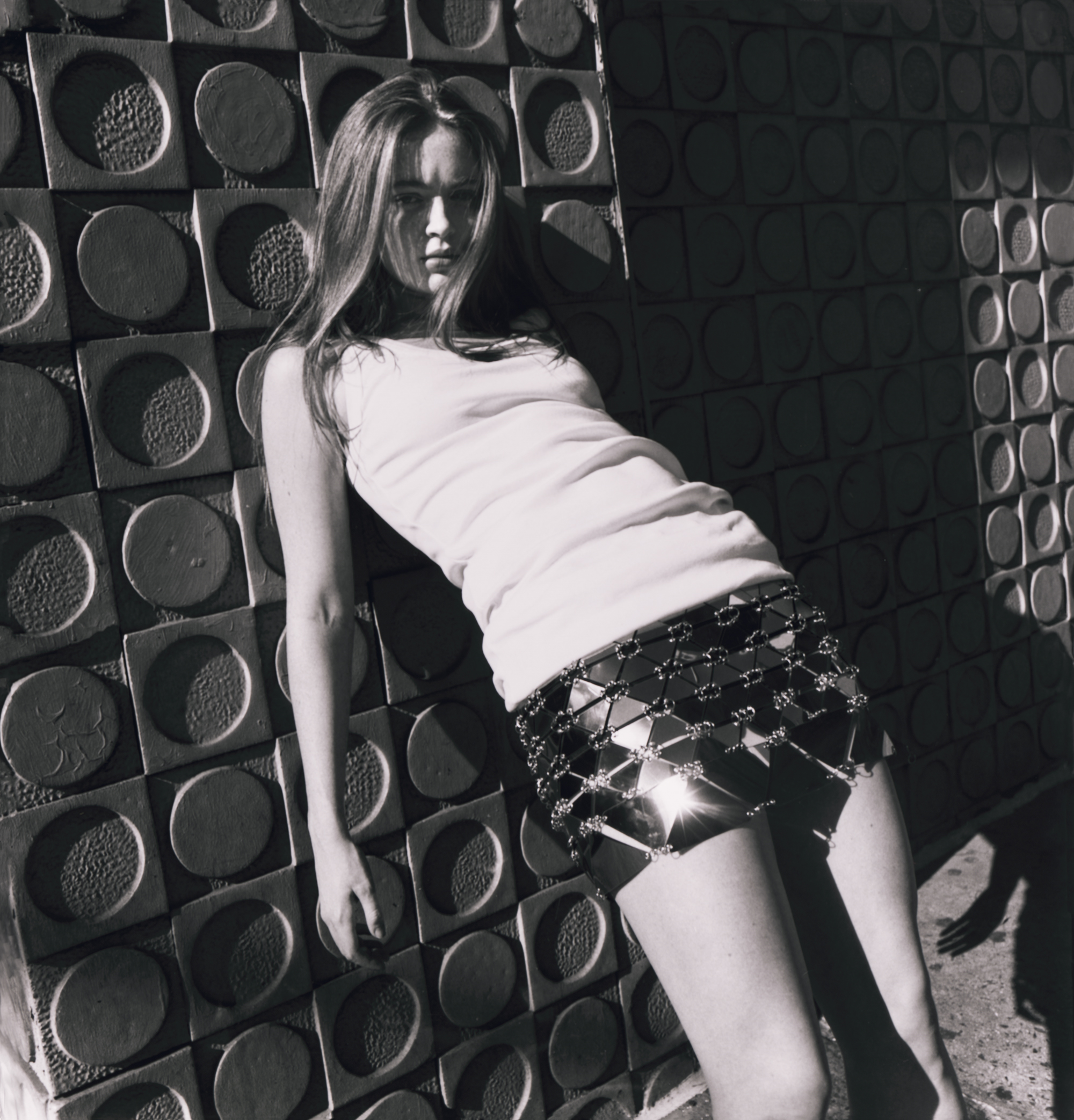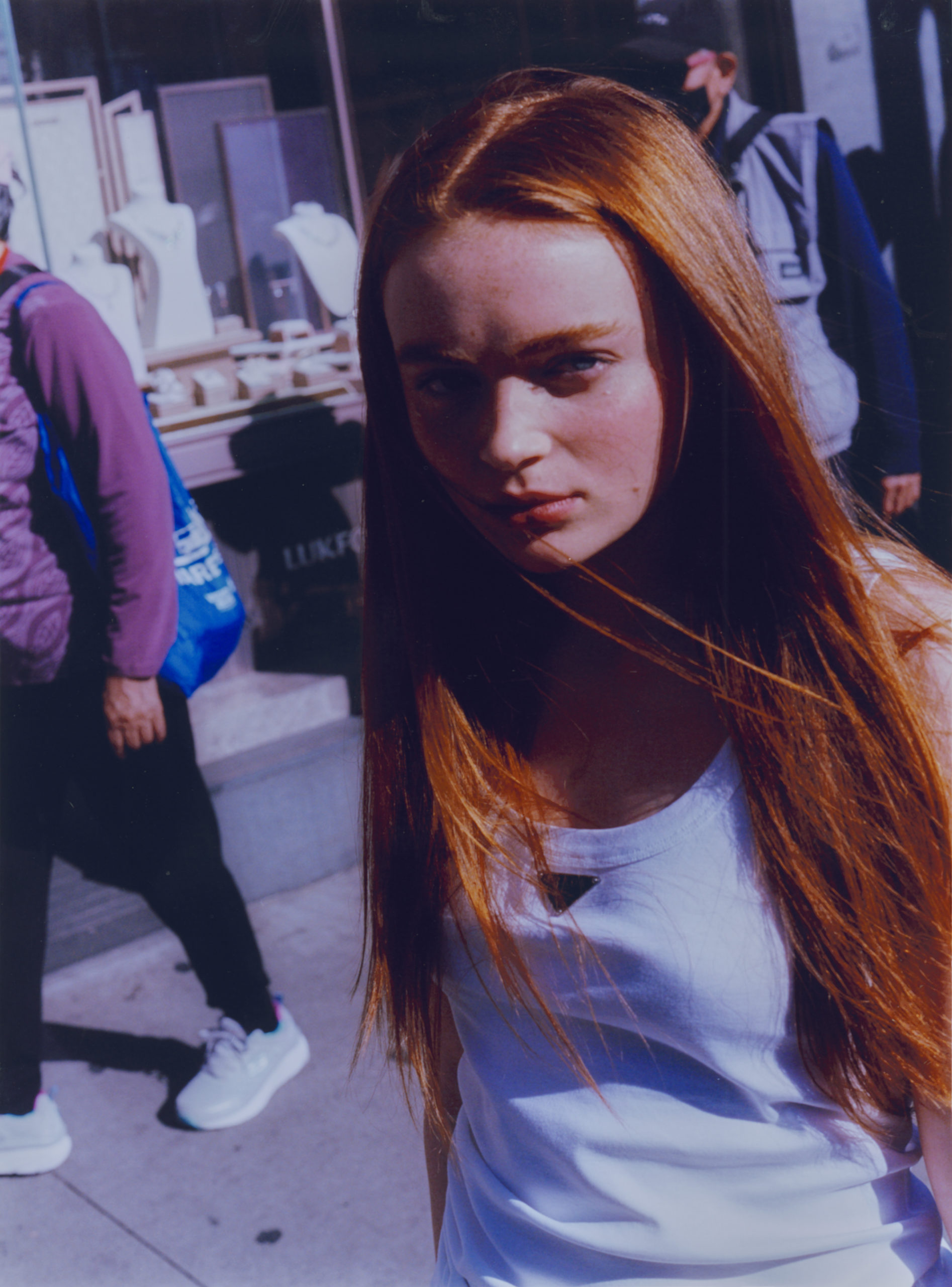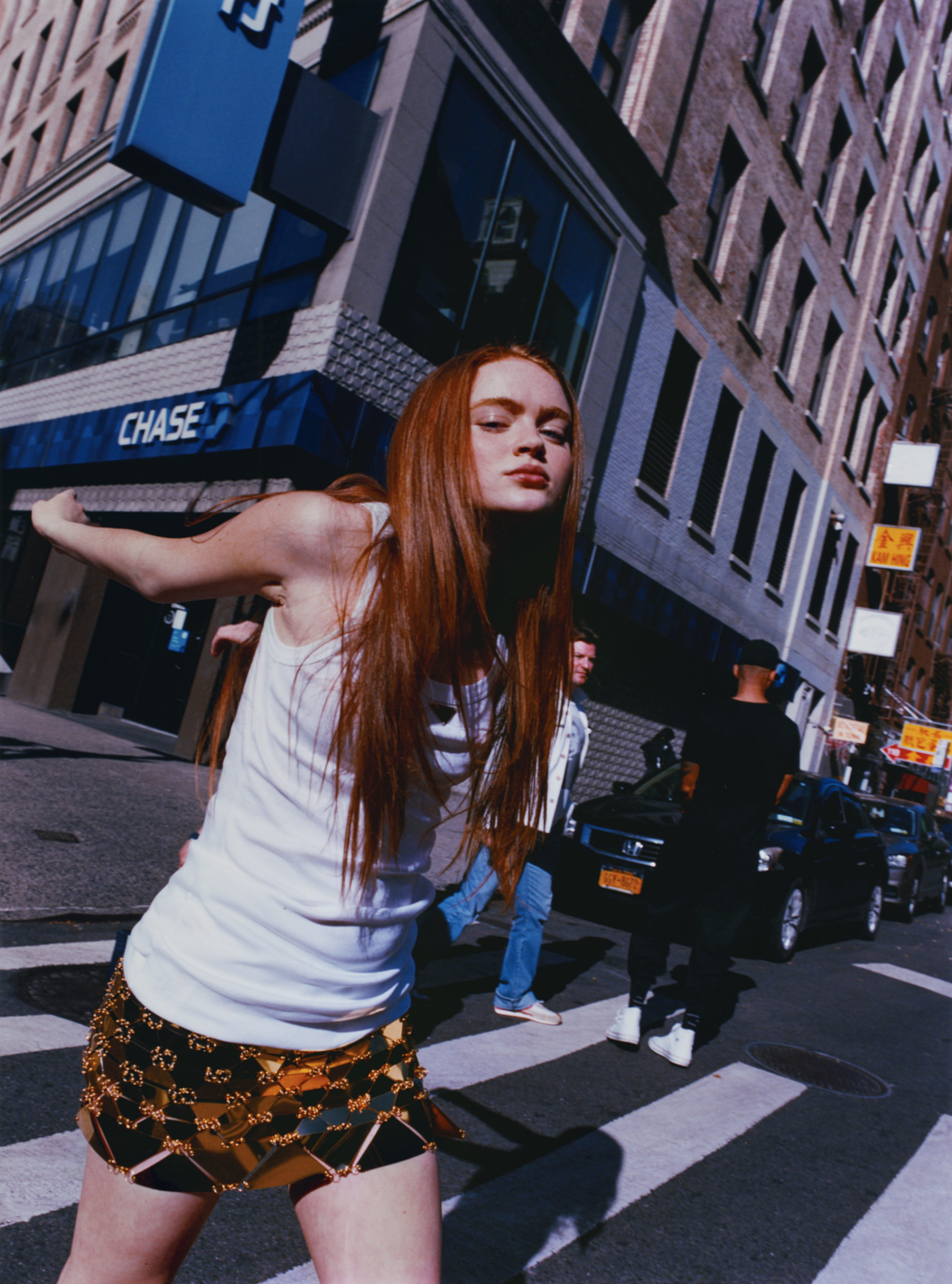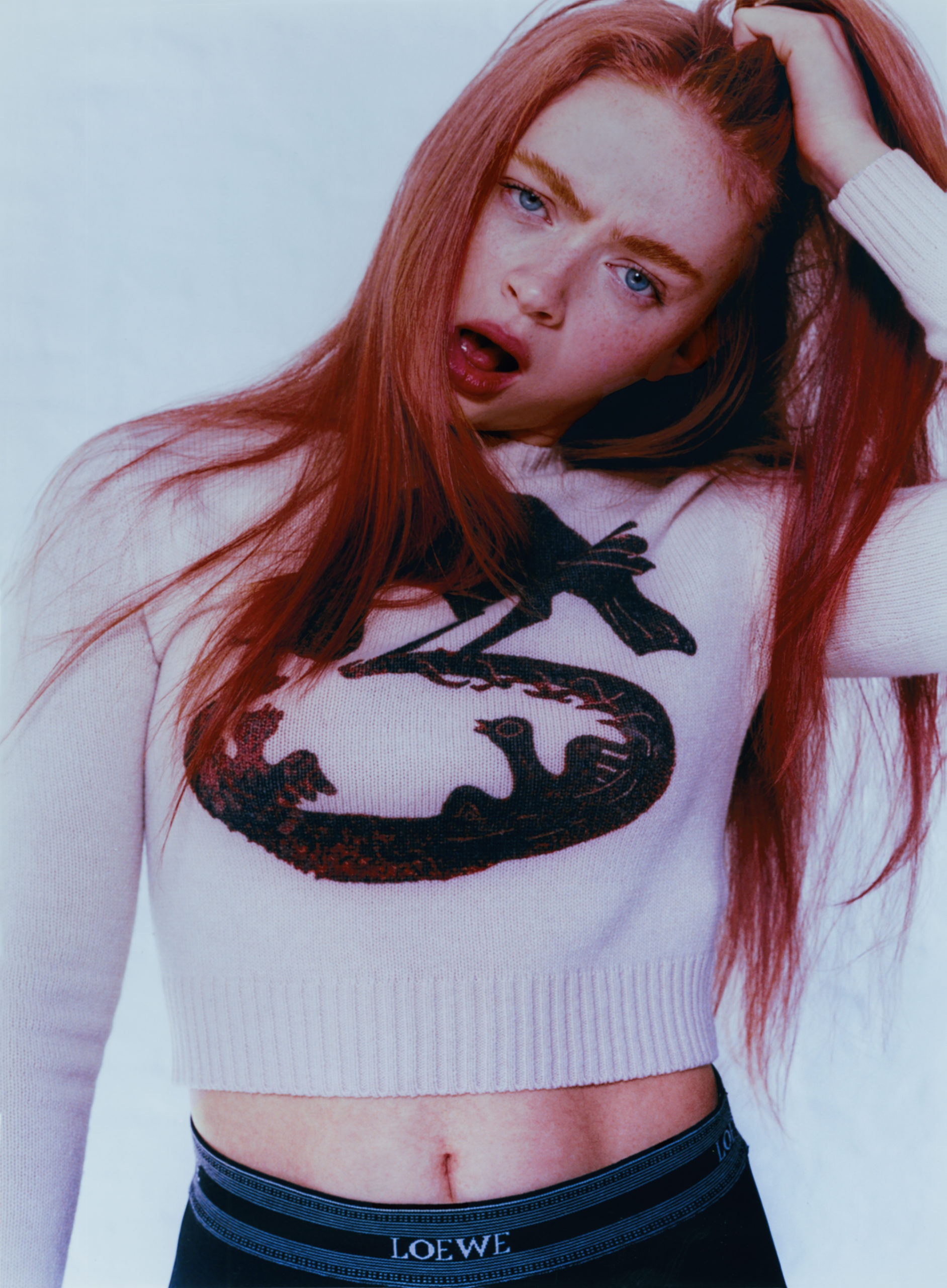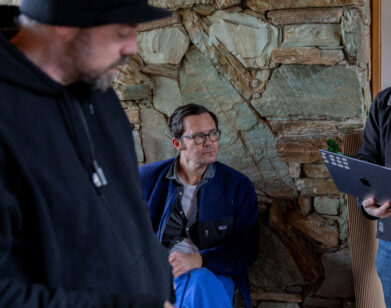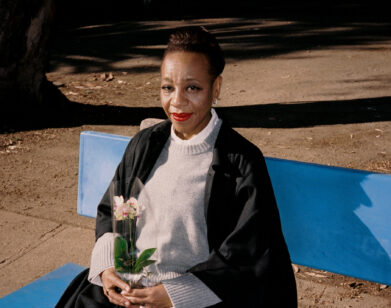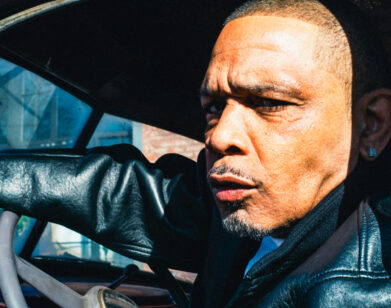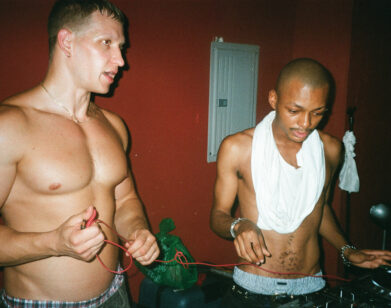IN CONVERSATION
Sadie Sink Tells Rooney Mara Why The Whale Is a Turning Point
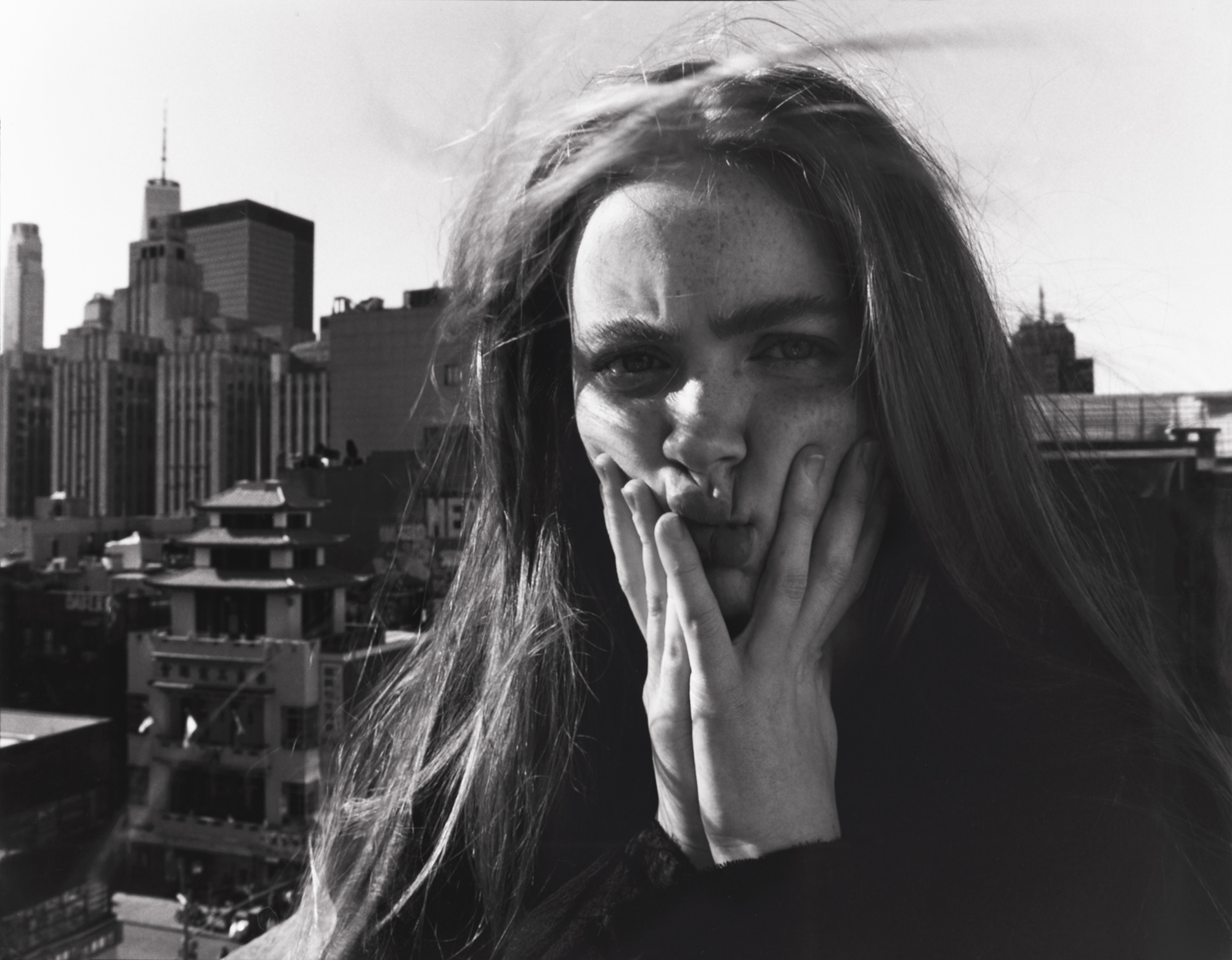
Coat by Miu Miu.
Most of the attention surrounding Darren Aronofsky’s The Whale has been rightfully aimed at Brendan Fraser’s comeback role as a morbidly obese English teacher trying to make amends with his estranged daughter. But all that focus creates the perfect conditions for Sadie Sink’s sneak-attack performance as said daughter, which punches you in the gut when you least expect it. As Ellie, a teenager so troubled that some of the film’s characters question if she might be evil, Sink enters each scene as a ferocious ball of energy that jolts an otherwise quiet film to life. For the 20-year-old actor, the role points towards a career post-Stranger Things, the world-beating Netflix show she’s been starring in since she joined the cast five years ago, and which will end with its upcoming fifth season. Sink recently connected with the actor Rooney Mara to talk about moving on from the show, her veganism, and leaving child acting behind. —BEN BARNA
———
ROONEY MARA: Hi Sadie. How are you?
SADIE SINK: I’m good, how are you?
MARA: Good. Where are you?
SINK: I’m in Prague.
MARA: Oh, wow. Are you working?
SINK: No, I just randomly took a trip here. I’ll do some work exploring tomorrow, go see some castles.
MARA: To be 20 and in Prague. How fun. Okay. It’s very awkward to have a conversation with someone you know that’s being recorded, but we’ll do our best to act normal.
SINK: It will be fun!
MARA: Are you good at interviews?
SINK: I think I’m really bad at them. After every interview I do, I’m like, “What did you just say?”
MARA: Because I’m really bad. You picked maybe one of the worst interviewees to interview you.
SINK: I doubt that.
MARA: So how old were you when you knew that you wanted to act?
SINK: I started acting when I was eight. It was just this fun thing I liked to do that I never took too seriously, until all of a sudden, I was doing it in a professional environment, which happened when I was around 10. Just the other day, my mom was like, “You realize it’s been a decade since you made your Broadway debut?” Which seems crazy. But I can’t picture myself doing anything else and I never really took the time to learn how to do anything else, so I’m glad it’s all working out.
MARA: I just worked with Sarah Polley, who was a child actor, and she’s been very open about her negative experiences, so I’m curious, maybe enough time hasn’t gone by for you to have enough perspective, but do you ever wonder or fantasize what life would’ve been like if you had had a more normal childhood? Or if you ever think about how it’s shaped who you are today? Do you have any regrets about starting so young, or does it all feel positive?
SINK: There’s definitely some negative things that come with placing a lot of pressure on yourself from a very young age, especially when you’re surrounded by adults and you’re working in a professional working environment. I have thought about, “Hmm, what would I be doing right now if it hadn’t worked out or if I didn’t want to act?” And it honestly kind of terrifies me. Basically, from the moment I decided I wanted to do theater, I haven’t stopped going since. So it’s all I really know.
MARA: My partner [Joaquin Phoenix] was a child actor, and he doesn’t have any regrets. He has overwhelmingly positive memories. You were lucky because you worked with Helen Mirren and all these amazing people so early on. Do you feel like that affected the choices that you’ve made or the kind of actress that you want to be?
SINK: Definitely. I think working with people like Helen, and just being in a theater environment too, was the perfect introduction to acting. I feel like if I would’ve started out as a Disney kid or something, it’s just a different impression of the industry and of the craft, really. Whereas in theater it was more contained and it was less flashy, I guess.
MARA: Is theater something you see yourself going back to, or do you prefer working in the medium of film now?
SINK: I definitely want to go back to the theater. When I started doing film and TV for the first time when I was around 14, right before Stranger Things, it was scarier than anything because it was so different, and no one really teaches you how film sets work. Even the first season of Stranger Things, it was the first TV show that I’d been on of that caliber, so I felt like I didn’t really know what I was doing in that world.
MARA: It’s scary. My sister was acting professionally when she was younger, so I had been around sets, and I remember it was terrifying. The energy can be so high-intensity and stressful.
SINK: And even coming from the theater, where you cannot mess up, for some reason it’s scarier on a set, when you do have the option to mess up. The stakes feel much higher.
MARA: We almost worked together right at that time. It was like eight or nine years ago, when we almost did Utopia with David Fincher. That was right before Stranger Things, right?
SINK: Yeah.
MARA: If that had gone gone forward, you wouldn’t have ended up in Stranger Things.
SINK: No. I think about that all the time, because I remember how excited I was for that project, and then it was devastating when it wasn’t happening. But it was a blessing in disguise. Obviously, because I wouldn’t have been able to do Stranger Things, but also because right after that I went back to school. I’d been homeschooled since second grade, and when Utopia didn’t happen, my parents were like, “Alright, go to school then.” And that was so, so important for me, because I’d been out of that environment for so long. It was good for me to be a kid.
MARA: How long have you been vegan?
SINK: I think I’m in my seventh year.
MARA: When did that start? There’s very few of us, so I’m just curious.
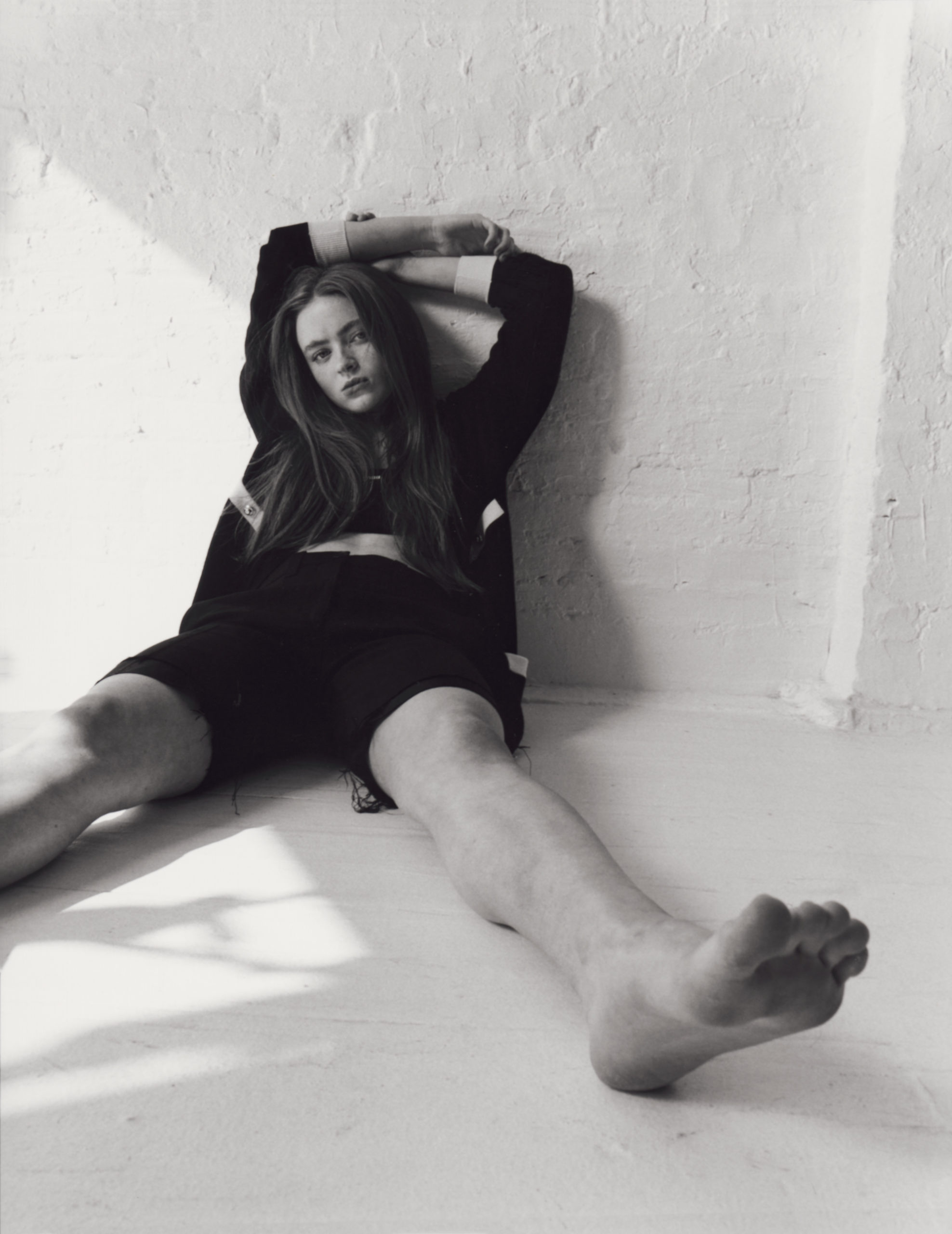
Sweater, Bra, and Shorts by MIU MIU,
SINK: I was vegetarian first because a friend from school told me that I couldn’t do it. I watched a documentary, and I was like, “I think I’m going to go vegetarian.” And she’s like, “Oh my god, Sadie, you wouldn’t last a week.” I’m very competitive, so I was like, “No, I can do this.” I did it for a year and it stuck, and then I made the full switch after being around vegans. I had never really met anyone who was actually vegan, it was more of a myth than something people actually did, but then once I was spending time around people who had live that way for 10 years, I was like, “Oh, this is so doable.” It’s really just a matter of sticking with it for the first year, and then after that you don’t even really think about it.
MARA: For me, it took more than a year to not think about it. It was helpful to do things slowly. I phased things out over time. Not just food, other things, too. And now it doesn’t cross my mind.
SINK: Exactly.
MARA: I want to talk to you about The Whale. I was curious if you went through any sort of phase as a teen that is similar to Ellie.
SINK: No. I was just talking about this with my mom, because I have a 12-year-old sister and she’s definitely going through that angsty teenage phase where she likes to pick arguments and be very aggressive. And I was like, “Was I ever like that?” And she was like, “No, you weren’t.” That wasn’t an option for me. I was working with adults so I couldn’t have outbursts of rage or angst.
MARA: So how did it feel to play a character with all of that repressed feeling? It must have been nice to just get it out.
SINK: Everything about her is kind of not me, and sometimes that’s hard to understand. She’s so unlikable and frustrating at times. But other times, it does feel like a bit of a release to step into someone else’s shoes and be that aggressive because I would never be that in my own life.
MARA: What do you think about her? Because her parents have such differing views on her in the film, or at least they express that in the moment. I’m sure her mom doesn’t really feel that way about her, but how did you feel about her?
SINK: I went back and forth depending on what scene we were working on, where I’d just have these moments of, “Is she actually evil?” And then there would be some days where I was like, “No, she’s good. She’s just in so much pain.” I think ultimately, at the end, she wants everyone to hate her, but I don’t think she’s actually evil. She’s just got a lot of baggage that she’s yet to unpack, or that no one’s allowed her the space to do that. There’s a good person in there.
MARA: There’s very few people—at least this is how I feel—on this earth who are truly evil. Generally, that that kind of behavior is coming from a place of pain or self-hatred, and if you feel that way about yourself, you want other people to verify that for you. Toward the end of the film when Charlie says, “People are amazing,” I was so blown away by that moment and the genuine belief he has in it when he says it. Because I feel that a lot of the time. There’s many days I feel the opposite, but I just thought, “Oh my god, how beautiful.” What a beautiful human to be able to be living in the hurt and pain that he’s living in and be able to have that sentiment. I was curious if you share that worldview with him? How do you feel about humans in general?
SINK: That line is essentially what the film is about. That’s who Charlie is and what he believes. I kind of side with you on that, where some days I do believe that, or at least I want to, but people make it really hard. So I admire Charlie just for that consistent outlook on humanity. But yeah, it doesn’t always feel like it’s the case.
MARA: Do you think Ellie was trying to help Thomas by sending those pictures?
SINK: Oh, this is good. I go back and forth with it, but this is what I’ve ultimately settled on. I think the time that she spent with Charlie, she learned what unconditional love and forgiveness from a parent looks like. So when she’s listening to Thomas’s story, I think she knows deep down that if his parents knew where he was and heard what he was saying, they would forgive him and want him to come home. So when she sends the voice memo and the photo, I think she knows it’s going to help him, but if it doesn’t, she doesn’t really care and she can just kind of add it to the list of horrible, confusing things she has done.
MARA: Maybe it’s also sort of a test, because she seems to be testing Charlie a lot.
SINK: Oh, for sure. “Will he still think I’m this amazing person if I put Ambien in the sandwich?” Stuff like that.
MARA: It’s amazing, especially as a parent, to watch that and be like, “Yep, he still feels that way.” I mean, I only have a two year old. He’s not putting Ambien in my sandwich and he is perfect, but yeah, I look at him and I feel that way about it. There’s nothing he could do that would make me stop loving him.
SINK: Right.
MARA: You weren’t even born yet when Brendan Fraser was a movie star. What was your level of familiarity with him when you guys started working, and did you go back and look at any of his previous work?
SINK: I had no clue who he was. We did a reading of the script a year before we shot it, and it was a random group of actors that Darren had put together, but Brendan was there and I was there, and I didn’t know who he was. I didn’t grow up with his movies. But I saw it as an exciting opportunity to get to know him as Charlie and see him as this character, so I think that served me in a lot of positive ways. But post-wrap, I’ve gotten to see his old movies and it’s been really, really fun.
MARA: Did I hear that you were shooting Stranger Things simultaneously with The Whale?
SINK: Yes. I wasn’t going back and forth between the two of them, but I was in production on season four, and then The Whale was starting production and Darren wanted me to be fully on The Whale, and he wanted first position, which is impossible for Netflix and for Stranger Things to give up. So I didn’t think it was going to work out. But Matt and Ross, the Duffer Brothers, really want the kids to be able to do projects outside of Stranger Things, especially given how long it takes to shoot. So they were the driving force of making this happen.
MARA: Wow, that’s amazing. You’ve had really incredible people around you, it seems. How long did you shoot The Whale for?
SINK: It was about a month of rehearsals and then two months of shooting.
MARA: That’s a nice amount of time. So you took a pause from Stranger Things and then went back. What was that like?
SINK: It really helped me because I’d never done a project like The Whale or worked with someone like Darren. Working on that gave me this level of confidence in front of the camera that I did not have before. So going back to Stranger Things after that, I felt really different and I think everyone could tell the difference, too. There was a shift. That comes with stepping out of the child actor role and into, I don’t know, your adulthood, where you stop seeing yourself as this little puppet that stands on their mark and takes direction. It becomes more fun once you realize it’s actually very collaborative, and if you have a question you can ask it and your opinions are really valued. But I needed to learn that lesson and grow up a little bit, so I’m glad that happened.
MARA: Wow, that’s amazing. I remember being taught that. Even though I didn’t start as a child, even as an adult starting out, you feel like that. Like “I shouldn’t have a voice. I shouldn’t have an opinion.” And I was also really lucky to work with people who empowered me to have a voice and a point of view and were curious to know what that was. It’s such an important lesson to learn. Stranger Things is about to start its final season, right?
SINK: Yeah.
MARA: What is that like?
SINK: I don’t know. From the moment I got the call that I was cast, everything’s kind of been one big blur. So to think that there’s actually an end to all of this is kind of insane. But I think the thing that’s going to be the most challenging is not having that security blanket of knowing that we have Stranger Things to go back to. But it’s been a long time and who knows how old I’ll be by the time season five comes out. It’s been a long journey.
MARA: I hate when people ask me this, but I’m going to ask you anyway. Have you been thinking about what you want the next part of your career to be like?
SINK: What I’ve learned is it’s just so important to work with filmmakers that you really believe in and trust. I’m excited to do more of that, and to work in the film space in general, because that’s not really something I’ve gotten to do a lot of. But honestly, I’m just kind of rolling with the punches at this point.
MARA: In real estate, it’s like “Location, location, location.” I would say in what we do it’s, “Director, director, director.” You have to follow the filmmaker. That’s been my experience, anyway. Is there anything else I haven’t asked you that you want to talk about, or anything embarrassing you want to share?
SINK: I think you covered everything. I’m very impressed.
MARA: Really? Am I a better interviewer than interviewee?
SINK: No, you’re a great interviewer.
MARA: Oh, good.
———
Hair: Tommy Buckett
Makeup: Tyron Macchausen
Photo Assistant: Jelanie Roberts
Styling Assistant: Lulu Lee
Location: Candy Studios

